SPECIAL SEMINAR FEATURING LEADING RESEARCHERS IN THE
COMPUTER SYSTEMS COMMUNITY
DATE: Thursday, June 7, 2001
TIME: 12:30 pm - 6:30 pm
PLACE: Roberts Hall, Singleton Room
SPEAKERS:
-
Hari Balakrishnan, powerpoint slides [1.6M]
Maurice Herlihy, powerpoint slides [481K]
Mike Jones, powerpoint slides [1.4M]
Jochen Liedtke, slides not available, White paper (pdf) [76K]
Andrew Myers, powerpoint slides [102K]
Brian Noble, powerpoint slides [155K]
CMU DIGITAL LIBRARY:
Digital video of each of the presentations is now available at The
CMU Universal Digital Library.
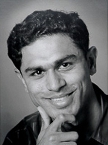 SPEAKER: Hari Balakrishnan,
MIT Lab for Computer Science
SPEAKER: Hari Balakrishnan,
MIT Lab for Computer Science
The Cricket Indoor Location System
Context-aware applications, which are able to adapt their behavior and human
interface to their external environmental context such as their physical
location, are an important class of applications in emerging pervasive
computing environments. I will describe Cricket, a system that provides
applications (and users) with location information, and exports a convenient
API for location-aware applications. Cricket uses active ceiling- or
wall-mounted beacons and passive listeners attached to devices, and provides
different forms of location information to applications, including (i) logical
spaces, such as which side of a room the device is in, (ii) the physical
coordinates of the device in some coordinate system (e.g., GPS), and (iii) the
orientation ("heading") of the device with respect to some coordinate system.
This combination of features makes Cricket unique, and it works well inside
buildings; as a result, it enables a variety of applications from
speech-driven active maps, to directional viewfinders, to navigation aids
for blind (and sighted) people. I will discuss how Cricket's hardware
and software work, how well the system works, and talk about its API and
how it eases application development.
BIO: Hari Balakrishnan is the KDD Career Development Assistant Professor of Communications Technology in the Department of Electrical Engineering and Computer Science and a member of the Laboratory for Computer Science (LCS) at MIT. He leads the Networks and Mobile Systems group at LCS, which explores research issues in wireless and mobile systems and computer networks. His current research interests are in pervasive context-aware networking and in developing robust infrastructures for the future Internet.
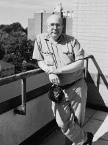 SPEAKER: Maurice Herlihy,
Brown University
SPEAKER: Maurice Herlihy,
Brown University
A Tale of Two Directories: Implementing Distributed Shared
Objects in Java
A directory service keep tracks of the location and status of mobile
objects in a distributed system. This paper describes our experience implementing
two distributed directory protocols as part of the Aleph toolkit, a
distributed shared object system implemented in Java. One protocol is a
conventional home-based protocol, in which a fixed node keeps track of the
object's location and status. The other is a novel arrow protocol, based on a
simple path-reversal algorithm. We were surprised to discover that the arrow
protocol outperformed the home protocol, sometimes substantially, across a
range of system sizes. This talk describes a series of experiments testing
whether the discrepancy is due to an artifact of the Java run-time system (such as
differences in thread management or object serialization costs), or whether it
is something inherent in the protocols themselves.
BIO:Maurice Herlihy is interested in practical and theoretical aspects of distributed computing. He has an A.B. in Mathematics from Harvard and a Ph.D. degree in Computer Science from M.I.T. He has been a faculty member at the CMU Computer Science department and a member of research staff at Digital Equipment Corporation's Cambridge Research Lab. In 1994, he joined the faculty at the Brown University Computer Science Department.
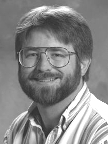 SPEAKER: Mike Jones,
Microsoft Research
SPEAKER: Mike Jones,
Microsoft Research
Predictability Requirements of a Soft Modem
Soft Modems use the main processor to execute modem functions
traditionally performed by hardware on the modem card. To function
correctly, soft modems require that ongoing signal processing
computations be performed on the host CPU in a timely manner. Thus,
signal processing is a commonly occurring background real-time
application - one running on systems that were not designed to support
predictable real-time execution. This paper presents a detailed study of
the performance characteristics and resource requirements of a popular
soft modem. Understanding these requirements should inform the efforts
of those designing and building operating systems needing to support
soft modems. Furthermore, we believe that the conclusions of this study
also apply to other existing and upcoming soft devices, such as soft
Digital Subscriber Line (DSL) cards. We conclude that (1) signal
processing in an interrupt handler is not only unnecessary but also
detrimental to the predictability of other computations in the system
and (2) a real-time scheduler can provide predictability for the soft
modem while minimizing its impact on other computations in the system.
BIO: Michael B. Jones is a member of the Systems and Networking Research Group at Microsoft Research. At Microsoft he has worked on Consumer Real-Time systems, the Rialto real-time operating system kernel, the Rialto/NT system, and the Tiger video fileserver. The goal of the consumer real-time research, of which the Rialto and Rialto/NT systems are part, is enabling independently developed real-time applications to successfully and predictably co-exist, both with each other and with non-real-time applications. He recently helped start the Herald project, whose goal is to build a publish/subscribe event notification service deployed as a self-configuring federation of peers designed to scale to Internet size and to provide timely delivery of notifications. He organized and co-chaired the first USENIX Windows NT Workshop. He co-chaired the Fourth USENIX Symposium on Operating Systems Design and Implementation (OSDI 2000). He is a member of the USENIX Association board of directors. Michael earned his Ph.D. in Computer Science from Carnegie Mellon University in 1992, where he was a member of the Mach project. He was a technical reviewer for the POSIX threads standards effort. His interests include operating systems, adaptive real-time systems, parallel and distributed systems, networking, musical performance, outdoor activities, and his fellow human beings.
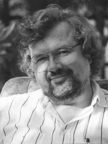 SPEAKER: Jochen Liedtke,
University of Karlsruhe, Germany
SPEAKER: Jochen Liedtke,
University of Karlsruhe, Germany
L4Ka - Vision, Pitfalls, and Status Quo
Microkernels are minimal but highly flexible kernels. Both conventional
and non-classical operating systems can be built on top or adapted to
run on top of them. Microkernel-based architectures should particularly
support extensibility and customizability, robustness including
reliability and fault tolerance, protection and security. After
desastrous results in the early 90's, the microkernel approach now seems
to be promising, although it still bears a lot of research risks.
The LKa research project aims at substantiating and establishing
a methodology for system construction that helps to manage
ever-increasing OS complexity and minimizes legacy dependence. Our
vision is a microkernel technology that can be and is used
advantageously for constructing any general or customized operating
system including pervasive systems, deep-computing systems, and huge
servers. The talk not only describes the fundamental vision but also
discusses in depth the currently known open problems (many of them are
related to real time) and analyzes the surprises and pitfalls we
experienced so far.
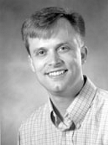 SPEAKER: Andrew Myers,
Cornell University
SPEAKER: Andrew Myers,
Cornell University
Enforcing Confidentiality in Low-Level Programs
Protecting confidential data is a thorny problem for computer security:
standard security mechanisms are either inadequate or impractically
restrictive. A promising approach is to use static program analysis to
enforce information flow properties; however, previous work in this area
has at least two of the following three weaknesses:
- No proof that information is controlled
- No support for imperative programming with higher-order functions
- Not applicable to low-level code
I will present an expressive, low-level language that provably provides
information flow security. A key innovation is the use of ordered linear
continuations as the fundamental control construct. Source-level control
constructs (if, while, exceptions) can be translated into this construct
without increasing restrictiveness, thus permitting security verification
after compiling a secure source language.
BIO: Andrew Myers received his Ph.D. in Computer Science from MIT in 1999. He is currently an Assistant Professor at Cornell University. His research interests are in computer security, programming language design and implementation, and distributed and persistent object systems.
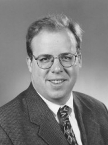 SPEAKER: Brian Noble,
University of Michigan
SPEAKER: Brian Noble,
University of Michigan
Mobile Network Estimation
Mobile systems must adapt their behavior to changing network
conditions. To do this, they must accurately estimate available
network capacity. Producing quality estimates is challenging, because
network observations are noisy - particularly in mobile, ad hoc
networks. Current systems estimate network capacity through simple,
exponentially weighted moving average (EWMA) filters. These filters
are either able to detect true changes quickly or to mask observed
noise and transients, but cannot do both. In this talk, we present a
set of filters designed to react quickly to persistent changes while
tolerating transient noise. Such filters are designed to be agile when possible, but stable when necessary, adapting
their behavior to prevailing conditions. We evaluate these filters in
a variety of networking conditions, including persistent and transient
change, congestion, and topology changes. We find that one filter,
based on techniques from statistical process control, provides
performance superior to the other three. Compared to two EWMA
filters, one agile and the other stable, it is able to offer the
agility of the former in four of five scenarios and the stability of
the latter in three of four scenarios.
BIO: Brian Noble is an Assistant Professor of Electrical Engineering and Computer Science at the University of Michigan. His research centers on software supporting mobile computing systems and their users. He received the Ph.D. in Computer Science from Carnegie Mellon University in 1998, where he worked on the Odyssey and Coda projects.
SDI / LCS Seminar Questions?
Karen Lindenfelser, 86716, or visit www.pdl.cmu.edu/SDI/
